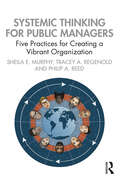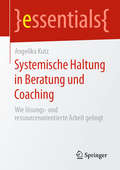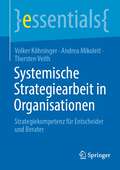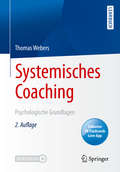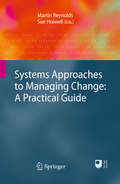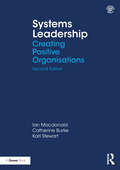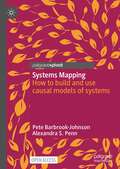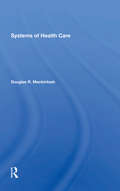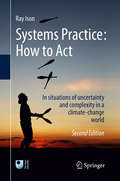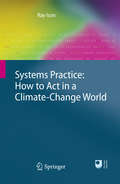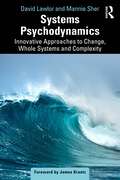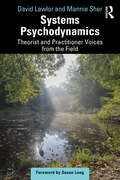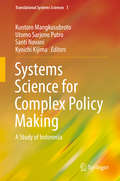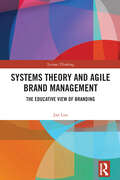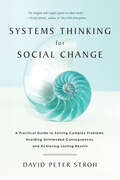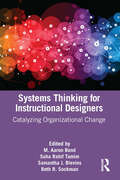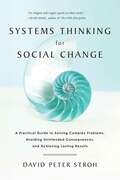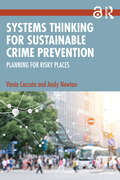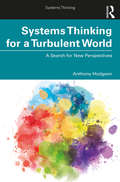- Table View
- List View
Systemic Structural Constellations and Sustainability in Academia: A New Method for Sustainable Higher Education
by Marlen ArnoldIn order to create truly sustainable universities, we require new methods of visualising and interpreting them holistically as institutions built on complex relationships and systems, rather than as individual departments and people operating independently. This book uses a systemic structural constellations approach to demonstrate how we can build more sustainable higher education institutions, both in terms of teaching and research and at an operational level. Drawing examples from current research and teaching, Systemic Structural Constellations and Sustainability in Academia explores how universities are not only centres of teaching and learning but can also play a crucial role in enabling future decision-makers to appreciate and contribute to a more sustainable future. Providing a clear introduction to systemic structural constellations and guidance on how to practically apply the theory to numerous aspects of the higher education system, this book will be of great interest to students and researchers of education for sustainable development, organisational learning and sustainable management, as well as those tasked with transforming the higher education system for the future.
Systemic Thinking for Public Managers: Five Practices for Creating a Vibrant Organization
by Philip Reed Sheila Murphy Tracey RegenoldOffering a pathway to vibrant organizations, this book integrates systems thinking, critical thinking, and design thinking, and provides the tools needed to proactively apply them in the social systems where we live and work. Systemic thinking—the combination of systems thinking, critical systems thinking, and design thinking—provides a way of addressing the complexity of problems faced by public sector managers. Far too often systemic thinking has been discussed theoretically rather than practically. This book changes that, enabling public sector managers and leaders to connect staff, partners, and stakeholders in the pursuit of thoughtfully designed and responsive service. Clearly written and designed to be put to immediate use on the job, each chapter provides a discussion of one specific practice. Included are guiding principles, a case study, relevant practical tools, and suggestions of for additional practice and reading.Using this book, managers of social systems such as public welfare, healthcare, public schools and libraries, housing and community development, and students of public administration will gain a deeper understanding of organizational systems and design, and a new toolkit to fortify their own organizations.
Systemische Haltung in Beratung und Coaching: Wie lösungs- und ressourcenorientierte Arbeit gelingt (essentials)
by Angelika KutzIn diesem essential wird gezeigt, dass das Handlungsportfolio der Systemik eine wunderbare Grundlage bietet, um Klienten – oder auch ein Klienten-System – bestmöglich dabei zu unterstützen, Veränderungsprozesse (Change) einzuleiten und zu gestalten und für das Klientensystem passende Lösungen zu erarbeiten. Die systemische Haltung ist zudem erlernbar, ein heilsamer Wegbegleiter in allen Lebenslagen und stellt einen kontinuierlichen Reifungsprozess dar.
Systemische Strategiearbeit in Organisationen: Strategiekompetenz für Entscheider und Berater (essentials)
by Volker Köhninger Andrea Mikoleit Thorsten VeithMegatrends und Disruptionen verändern die Organisationswelt radikal und erfordern neue Formen der Unternehmenssteuerung. Neben Strategiekompetenz werden die Verantwortungs- und Entscheidungskultur sowie die Lernfähigkeit von und in Organisationen essentielle Faktoren für zukünftigen Erfolg sein. Systemische Strategiearbeit liefert hierfür Anregungen und Konzepte – zur Gestaltung einer modernen Zukunftsarbeit.
Systemische Strukturaufstellungen in Beratung und Management: Das Implizite Und Unbewusste Wissen Für Entscheidungen Aktivieren
by Marlen Gabriele ArnoldDieses Buch bietet fundierte Einblicke in eine faszinierende neue Methode, mit der Systeme erfasst, abgebildet und erprobt werden können. Inhaltlicher Schwerpunkt sind betriebswirtschaftliche und organisationale Faktoren. Die Autorin beschreibt Entscheidungsherausforderungen in den Bereichen Individuum, Organisation und System. Sie zeigt verschiedene Aufstellungsformate für das systemische Arbeiten im Managementkontext. Neben der theoretischen Aufbereitung werden praktische Beispiele auf allen drei Ebenen (Person, Organisation und System) anschaulich dargestellt und visualisiert. Prägnante Bilder der Aufstellungen unterstützen das Verständnis und veranschaulichen, wo konkrete Nutzungspotenziale liegen.
Systemisches Coaching: Psychologische Grundlagen
by Thomas WebersDieses Lehrbuch gibt eine kompakte und übersichtliche Einführung ins Business-Coaching. Dies geschieht einerseits auf Basis der modernen Systemtheorie, deren Relevanz für Coaching erschlossen wird. Andererseits werden die zentralen Grundlagen der wissenschaftlichen Psychologie für Coaching herausgearbeitet und in Anwendung gebracht. In dieser Kombination erweist sich Coaching als evidenzbasierte professionelle Dienstleistung – und dieses Werk als geeignete Lektüre für Studierende und Coaching-Praktiker gleichermaßen.
Systemisches Fragen: Professionelle Fragekompetenz für Führungskräfte, Berater und Coaches (essentials)
by Andreas PatrzekDas essential stellt praxisnah dar, wie durch Fragekompetenz erfolgreiches Führen, Beraten und Coachen gelingt. Es bringt die wesentlichen Definitionen und Techniken auf den Punkt, vermittelt die theoretischen Grundlagen und Strategien und zeigt die Umsetzung. Orientiert an zentralen Merkmalen des systemischen Ansatzes wird die Kunst der Fragekompetenz verständlich dargestellt. Mit zahlreichen konkreten Beispielen und Formulierungshilfen für die tägliche Praxis.
Systemisches Fragen: Professionelle Fragetechnik für Führungskräfte, Berater und Coaches (essentials)
by Andreas PatrzekDas kompakte Buch stellt praxisnah dar, mit welchen Fragetechniken erfolgreiches Führen, Beraten und Coachen gelingt. Es bringt die wesentlichen Definitionen und Techniken auf den Punkt, vermittelt die theoretischen Grundlagen und Strategien und zeigt die Umsetzung. Orientiert an zentralen Merkmalen des systemischen Ansatzes wird die Kunst der Fragetechnik verständlich dargestellt. Mit zahlreichen konkreten Beispielen und Formulierungshilfen für die tägliche Praxis.
Systemisches Fragen: Professionelle Fragetechnik für Führungskräfte, Berater und Coaches (essentials)
by Andreas PatrzekDas essential stellt praxisnah dar, mit welchen Fragetechniken erfolgreiches F#65533;hren, Beraten und Coachen gelingt. Es bringt die wesentlichen Definitionen und Techniken auf den Punkt, vermittelt die theoretischen Grundlagen und Strategien und zeigt die Umsetzung. Orientiert an zentralen Merkmalen des systemischen Ansatzes wird die Kunst der Fragetechnik verst#65533;ndlich dargestellt. Mit zahlreichen konkreten Beispielen und Formulierungshilfen f#65533;r die t#65533;gliche Praxis.
Systems Approaches to Managing Change: A Practical Guide
by Martin Reynolds Sue HolwellIn a world of increasing complexity, instant information availability and constant flux, systems approaches provide the opportunity of a tangible anchor of purpose and iterate learning. The five approaches outlined in the book offer a range of interchangeable tools with rigorous frameworks of application tried and tested in the 'real world'. The frameworks of each approach form a powerful toolkit to explore the dynamics of how societies emerge, how organisations create viability, how to facilitate chains of argument through causal mapping, how to embrace a multiplicity of perspectives identifying purposeful activity and how to look for the bigger picture across multiple disciplines. Systems Approaches offers an excellent first introduction for those seeking to understand what 'systems thinking' is all about as well as why the tools discussed herein should be applied to management and professional practice. This book provides a practical guide, and the chapters stand alone in explaining and developing each approach.
Systems Leadership: Creating Positive Organisations
by Ian Macdonald Catherine Burke Karl StewartThe new edition of this influential and bestselling book is concerned with how people come together to achieve a productive purpose. Survival and success in business and social terms have always depended upon our ability to form and sustain social organisations. People have a deep need to be creative and to belong. By creating positive organisations we can fulfil these needs and build a worthwhile society. One of the failures of organisations is precisely the lack of efficient and effective social organisation, which is what this whole book is about. Poor social organisation, including poor leadership, are major drivers of poor productivity and lead people to give up or retreat into a minimalist approach of just doing what is needed to get by and survive. The authors provide a language for developing, discussing, thinking and working with propositions about organisations and management. They do not tell you what decision to make but rather present tools to help you consider, analyse and predict the consequences of your decisions. This new edition is much broader in its application areas – public, private and not-for-profit sectors. It contains new models and propositions with regard to types of social organisation, domains of work and the nature and use of authority. It contains a range of new case studies, and throughout looks at how these ideas can be used to achieve an organisation’s purpose while encouraging creative working. It is not a book about fads or fashion but an integrated approach that offers the user the benefit of foresight.
Systems Mapping: How to build and use causal models of systems
by Pete Barbrook-Johnson Alexandra S. PennThis open access book explores a range of new and older systems mapping methods focused on representing causal relationships in systems. In a practical manner, it describes the methods and considers the differences between them; describes how to use them yourself; describes how to choose between and combine them; considers the role of data, evidence, and stakeholder opinion; and describes how they can be useful in a range of policy and research settings. This book provides a key starting point and general-purpose resource for understanding complex adaptive systems in practical, actionable, and participatory ways. The book successfully meets the growing need in a range of social, environmental, and policy challenges for a richer more nuanced, yet actionable and participatory understanding of the world. The authors provide a clear framework to alleviate any confusion about the use of appropriate terms and methods, enhance the appreciation of the value they can bring, and clearly explain the differences between approaches and the resulting outputs of mapping processes and analysis.
Systems Of Health Care
by Douglas R. MackintoshThis comprehensive introductory text describes health systems in the United States and in other countries, with emphasis on their ability to deliver goods and services, their cost, and their operation within a legal framework. Included is a discussion of such major developments as prepaid group practice, automated multiphasic health testing, national health insurance, professional standards review organizations, comprehensive health planning, and malpractice arbitration. The author underlines the salient features of the various systems by presenting and discussing advertisements for health products and services. Flow diagrams, charts, tables, and discussion questions help the reader understand the complexities and interrelationships of health care systems. Extensive references and suggestions for further reading are also included.
Systems Practice: How to Act
by Ray IsonIt is now accepted that humans are changing the climate of the Earth and this is the most compelling amongst a long litany of reasons as to why, collectively, we have to change our ways of thinking and acting. Most people now recognise that we have to be capable of adapting quickly as new and uncertain circumstances emerge: this capability will need to exist at personal, group, community, regional, national and international levels, all at the same time. Systems Practice is structured into four parts. Part I introduces the societal need to move towards a more systemic and adaptive governance against the backdrop of human-induced climate change. Part II unpacks what is involved in systems practice by means of a juggler metaphor; examining situations where systems thinking offers useful understanding and opportunities for change. Part III identifies the main factors that constrain the uptake of systems practice and makes the case for innovation in practice by means of systemic inquiry, systemic action research and systemic intervention. The book concludes with Part IV, which critically examines how systems practice is, or might be, utilised at different levels from the personal to the societal. The development of our capabilities to think and act systemically is an urgent priority and Systems Practice aims to show how to do systems thinking and translate that thinking into praxis (theory informed practical action) which will be welcomed by those managing in situations of complexity and uncertainty across all domains of professional and personal concern.
Systems Practice: How to Act in a Climate Change World
by Ray IsonIt is now accepted that humans are changing the climate of the Earth and this is the most compelling amongst a long litany of reasons as to why, collectively, we have to change our ways of thinking and acting. Most people now recognise that we have to be capable of adapting quickly as new and uncertain circumstances emerge: this capability will need to exist at personal, group, community, regional, national and international levels, all at the same time. Systems Practice is structured into four parts. Part I introduces the societal need to move towards a more systemic and adaptive governance against the backdrop of human-induced climate change. Part II unpacks what is involved in systems practice by means of a juggler metaphor; examining situations where systems thinking offers useful understanding and opportunities for change. Part III identifies the main factors that constrain the uptake of systems practice and makes the case for innovation in practice by means of systemic inquiry, systemic action research and systemic intervention. The book concludes with Part IV, which critically examines how systems practice is, or might be, utilised at different levels from the personal to the societal. The development of our capabilities to think and act systemically is an urgent priority and Systems Practice aims to show how to do systems thinking and translate that thinking into praxis (theory informed practical action) which will be welcomed by those managing in situations of complexity and uncertainty across all domains of professional and personal concern.
Systems Psychodynamics: Innovative Approaches to Change, Whole Systems and Complexity
by Mannie Sher David LawlorIn the second of this three-volume series, the authors expand on the theory and practice of systems psychodynamics – which integrates psychoanalytic thinking, open systems theory and complexity theory – in its applications to consultancy work in organisations and wider social contexts. Multidisciplinary and multitheoretical in nature, the systems psychodynamics paradigm develops from the understanding that no single theory or approach explains the complex nature of organisational systems. Replete with explanations of key theories, practical guidance and exercises, this book demonstrates how systems psychodynamics can be used by consultants to plan and put into action organisational changes in four main areas: change planning and management; action research and evaluation; leadership and whole systems; and professional development and next steps. In light of systems psychodynamics, rather than functioning as a leader of change processes, the role of an organisational development consultant is one of providing containment, understanding and facilitation for others to take up their leadership roles responsibly in their change processes. With a focus on practical application in real situations, this book will be invaluable for psychoanalysts, managers, policymakers, consultants and researchers in a wide range of professional and clinical settings.
Systems Psychodynamics: Theorist and Practitioner Voices from the Field
by Mannie Sher David LawlorThrough a series of in-depth interviews with Tavistock thinkers across three generations, this volume illustrates the practice and application of the systems psychodynamics paradigm to organisational development consultancy, research and training. Across 28 stimulating interviews with a group of international consultants, interviewees present a critical appraisal of the systems psychodynamics paradigm and its application to present-day social and organisational difficulties. By using a narrative interpretive method, the interviewers attend to the historical, psychosocial and biographical dynamics of the interviewees’ approaches and methods of work, and address several areas of organisational consultancy. These include organisational design, the division of labour, levels of authority and reporting relationships; the nature of work tasks, processes and activities; primary tasks and the inevitable unconscious dynamics within systems and individuals. The multi-disciplinary approaches of the interviewees will interest managers, policymakers, consultant practitioners and researchers to understand the variety of applications of systems psychodynamics methodologies.
Systems Science for Complex Policy Making: A Study of Indonesia (Translational Systems Sciences #3)
by Kuntoro Mangkusubroto Utomo Sarjono Putro Santi Novani Kyoichi KijimaThis volume applies a systems science perspective to complex policy making dynamics, using the case of Indonesia to illustrate the concepts. Indonesia is an archipelago with a high heterogeneity. Her people consist of 1,340 tribes who are scattered over 17,508 islands. Every region has different natural strengths and conditions. In the national development process all regions depend on one another other while optimizing their own conditions. In addition to this diversity, Indonesia also employs a democratic system of government with high regional autonomy. A democratic government puts a high value on individual freedom, but on the other hand, conflicts of interest also occur frequently. High regional autonomy also often causes problems in coordination among agencies and regional governments. This uniqueness creates a kind of complexity that is rarely found in other countries.These daily complexities requires intensive interaction, negotiation processes, and coordination. Such necessities should be considered in public policy making and in managing the implementation of national development programs. In this context, common theories and best practices generated on the basis of more simplified assumptions often fail. Systems science offer a way of thinking that can take into account and potentially overcome these complexities. However, efforts to apply systems science massively and continuously in real policy making by involving many stakeholders are still rarely carried out. The first part of the book discusses the gap between the existing public policy-making approach and needs in the real world. After that, the characteristics of the appropriate policy-making process in a complex environment and how this process can be carried are described. In later sections, important systems science concepts that can be applied in managing these complexities are discussed. Finally, the efforts to apply these concepts in real cases in Indonesia are described.
Systems Theory and Agile Brand Management: The Educative View of Branding (Systems Thinking)
by Jan LiesBrands started out as communication tools to influence the image of companies or products (inside-out thinking) but have developed into channels of social forces. Powerful brands impact not just customer decisions but also markets and social institutions, such as fashion trends, city life, or even social movements. This book explores the implications of Niklas Luhmann’s theory of social systems for the theory and practice of agile brand management, in particular highlighting the central role of brand aesthetics and of brands as channels for mutual education between companies and consumers.Since the rise of social media, “perfect” brands have become the mirror of community values as the communities themselves develop brand content. Brands themselves become “living systems” and evolve like systems do. The author introduces systems theory to provide a conceptual framework that integrates the different views of branding: inside-out and outside-in thinking. This Luhmannian theory of branding is discussed against the current background of (Western) societies, which are undergoing a broad shift from hard to soft selling in marketing, influenced by social media. The book is not about whether closed systems analysis and discussion can or should replace traditional management; moreover, it emphasizes the fruitful insights and demonstrates that the power of management is limited and should be extended by looking at the means of closed systems.This book will be of primary value to scholars with an interest in systems theory and thinking, brand theory, and management. The interdisciplinary approach also makes the book a valuable resource for those researching change management, agile management, and sociology.
Systems Theory for Pragmatic Schooling: Toward Principles of Democratic Education
by Craig A. CunninghamWriting for educators and education leaders, Cunningham shows that combining a philosophy of pragmatism with thinking about education as systems can illuminate challenges in contemporary schooling and provide practical solutions for creating a democratic education.
Systems Thinking For Social Change: A Practical Guide to Solving Complex Problems, Avoiding Unintended Consequences, and Achieving Lasting Results
by David Peter Stroh&“David Stroh has produced an elegant and cogent guide to what works. Research with early learners is showing that children are natural systems thinkers. This book will help to resuscitate these intuitive capabilities and strengthen them in the fire of facing our toughest problems.&”—Peter Senge, author of The Fifth Discipline Concrete guidance on how to incorporate systems thinking in problem solving, decision making, and strategic planning—for everyone!Donors, leaders of nonprofits, and public policy makers usually have the best of intentions to serve society and improve social conditions. But often their solutions fall far short of what they want to accomplish and what is truly needed. Moreover, the answers they propose and fund often produce the opposite of what they want over time. We end up with temporary shelters that increase homelessness, drug busts that increase drug-related crime, or food aid that increases starvation.How do these unintended consequences come about and how can we avoid them? By applying conventional thinking to complex social problems, we often perpetuate the very problems we try so hard to solve, but it is possible to think differently, and get different results.Systems Thinking for Social Change enables readers to contribute more effectively to society by helping them understand what systems thinking is and why it is so important in their work. It also gives concrete guidance on how to incorporate systems thinking in problem solving, decision making, and strategic planning without becoming a technical expert.Systems thinking leader David Stroh walks readers through techniques he has used to help people improve their efforts on complex problems like:ending homelessnessimproving public healthstrengthening educationdesigning a system for early childhood developmentprotecting child welfaredeveloping rural economiesfacilitating the reentry of formerly incarcerated people into societyresolving identity-based conflictsand more!The result is a highly readable, effective guide to understanding systems and using that knowledge to get the results you want.
Systems Thinking for Instructional Designers: Catalyzing Organizational Change
by M. Aaron BondSystems Thinking for Instructional Designers offers real-world cases that highlight how designers foster continuous improvement and manage change efforts across organizational contexts. Using a systems thinking approach, each case describes a holistic process that examines how a set of interdependent elements can be analyzed and coordinated to influence change. Instructional designers, faculty, program directors, digital learning leaders, and other development specialists will learn how systems thinking can solve authentic, real-world challenges. The book’s rich narratives cover both successes and failures of meaningful growth, paradigm shifts, and large-scale problem-solving in a variety of settings, including education and industry.
Systems Thinking for Social Change: A Practical Guide to Solving Complex Problems, Avoiding Unintended Consequences, and Achieving Lasting Results
by David Peter StrohConcrete guidance on how to incorporate systems thinking in problem solving, decision making, and strategic planning―for everyone! <p><p>Donors, leaders of nonprofits, and public policy makers usually have the best of intentions to serve society and improve social conditions. But often their solutions fall far short of what they want to accomplish and what is truly needed. Moreover, the answers they propose and fund often produce the opposite of what they want over time. We end up with temporary shelters that increase homelessness, drug busts that increase drug-related crime, or food aid that increases starvation. <P><P>How do these unintended consequences come about and how can we avoid them? By applying conventional thinking to complex social problems, we often perpetuate the very problems we try so hard to solve, but it is possible to think differently, and get different results. <P><P>Systems Thinking for Social Change enables readers to contribute more effectively to society by helping them understand what systems thinking is and why it is so important in their work. It also gives concrete guidance on how to incorporate systems thinking in problem solving, decision making, and strategic planning without becoming a technical expert.
Systems Thinking for Sustainable Crime Prevention: Planning for Risky Places
by Vania Ceccato Andy NewtonThis book offers a comprehensive overview of areas with elevated levels of crime, which we consider ‘risky places.’ These can be facilities, nodes, or paths and can be found everywhere, from small towns to megacities. Crime and fear are examined from the perspective of those who use these places, based on examples from the US, the UK, Sweden, Nigeria, Brazil, China, Australia, and more. Advocating for a systems thinking approach, the book shows what can be learned from risky places and identifies ways to address their inherent problems. The book also assesses current barriers to applying systems thinking and identifies ways to foster interconnected long-term crime prevention strategies that meet the diverse needs of multiple stakeholders. Aimed at academics, students, and professionals in urban planning, criminology, geography, and related fields, this book is a vital resource for those dedicated to creating safer, more inclusive, and sustainable environments. The Open Access version of this book, available at http://www.taylorfrancis.com, has been made available under a Creative Commons Attribution (CC-BY) 4.0 license.
Systems Thinking for a Turbulent World: A Search for New Perspectives (Systems Thinking)
by Anthony HodgsonSystems Thinking for a Turbulent World will help practitioners in any field of change engage more effectively in transformative innovation. Such innovation addresses the paradigm shift needed to meet the diverse unfolding global challenges facing us today, often summed up as the Anthropocene. Fragmentation of local and global societies is escalating, and this is aggravating vicious cycles. To heal the rifts, we need to reintroduce the human element into our understandings – whether the context is civic or scientific – and strengthen truth-seeking in decision-making. Aided by appropriate concepts and methods, this healing will enable a switch from reaction to anticipation, even in the face of discontinuous change and high uncertainty. The outcome is to privilege the positive human skills for collaborative navigation through uncertainty over the disjointed rationality of mechanism and artificial intelligence, which increasingly alienates us. The reader in search of new ways of thinking will be introduced to concepts new to systems thinking that integrate systems thinking and futures thinking. The concept of anticipatory present moment (APM) serves as a basis for learning the cognitive skills that better enable navigation through turbulent times. A key personal and team practice is participative repatterning, which is the basis for transformative innovation. This practice is aided by new methods of visual facilitation. The reader is guided through the unfolding of the ideas and practices with a narrative based on the metaphor of search portrayed in the tradition of ox herding, found in traditional Far Eastern consciousness practice.

